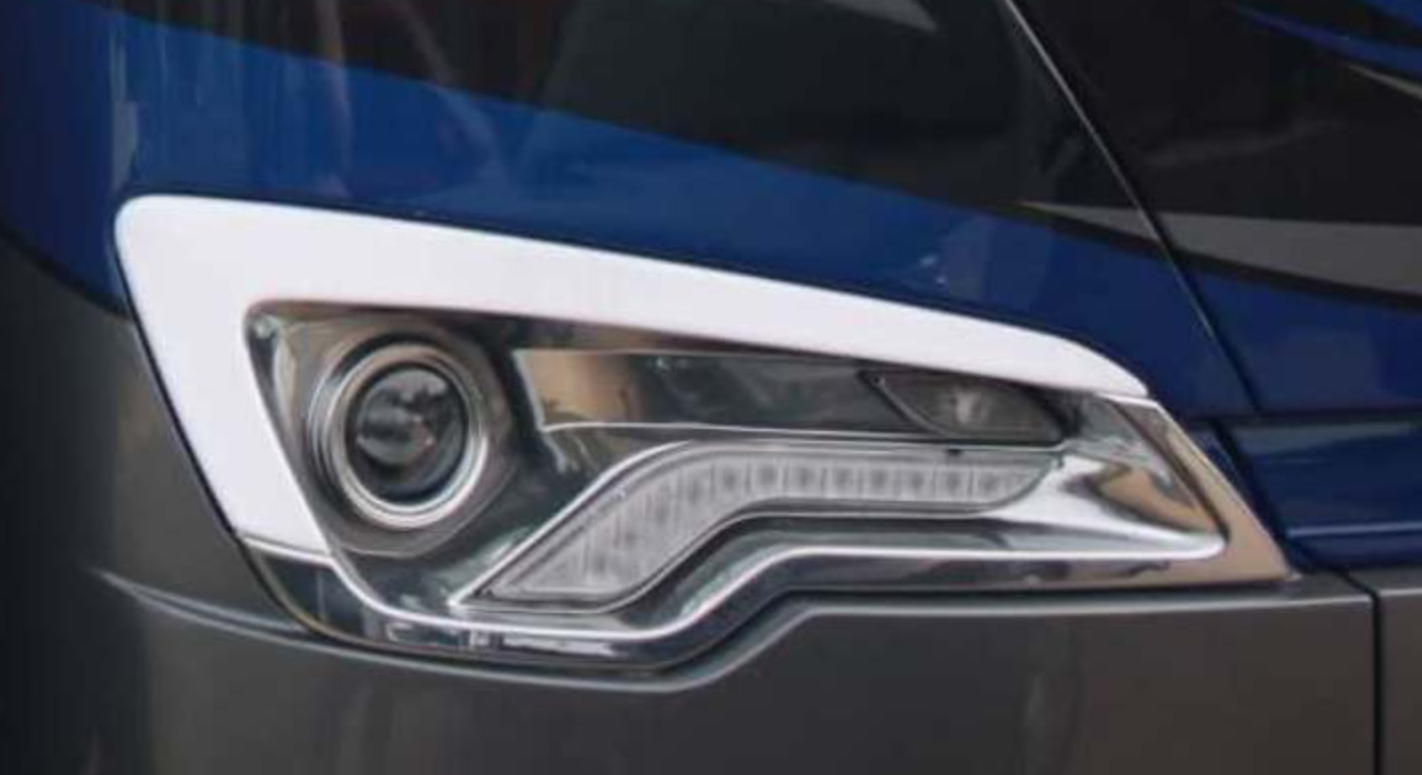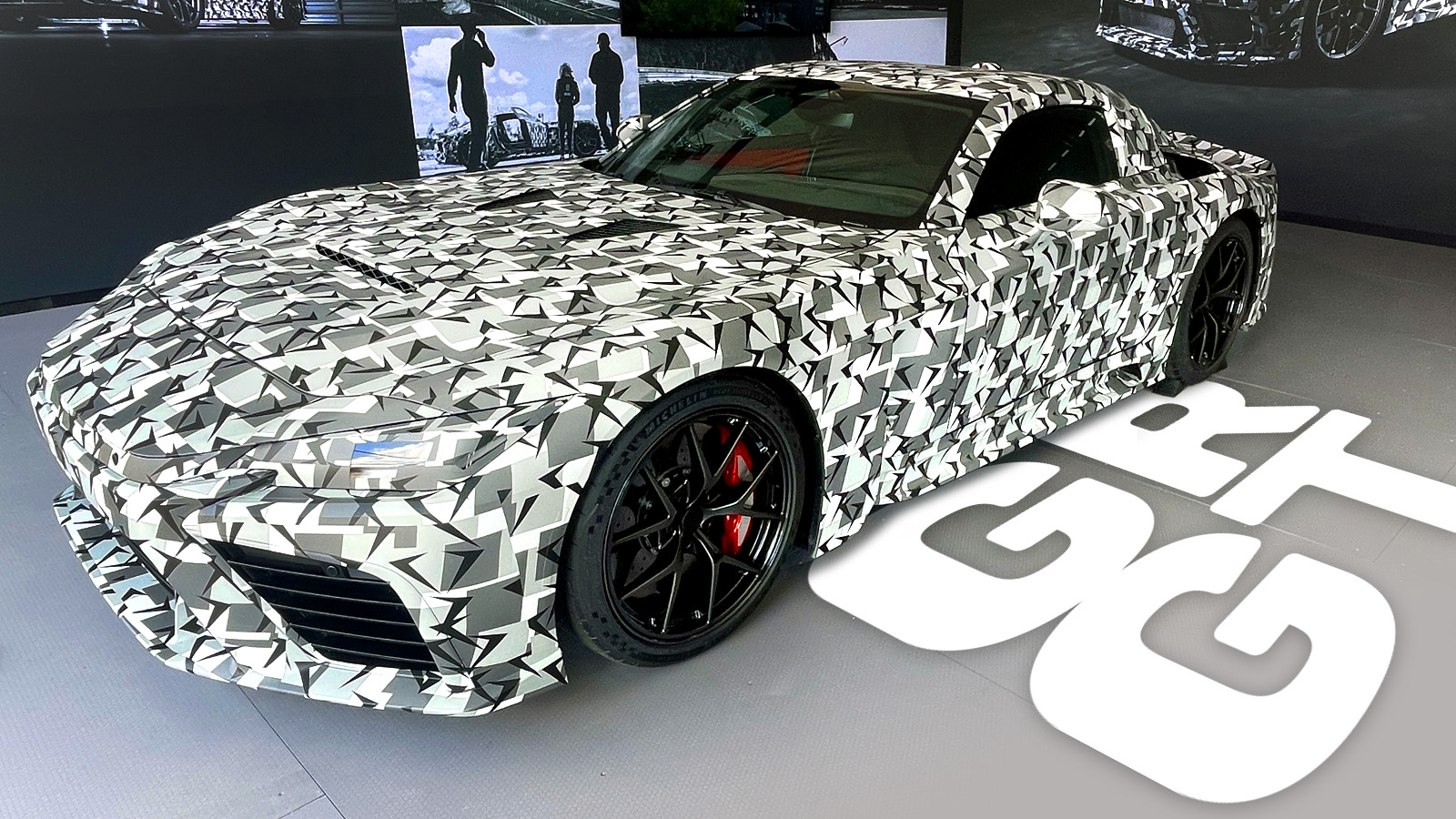Welcome back to Parts Bin Puzzle, the Autopian challenge where we give you a vehicle and you figure out where its bits came from! Because I have so much from the RV Open House, we’re returning back to the embrace of cars that you can crap in. This is the Tiffin Allegro Bus 45 OPP, a 45-foot luxury Class A motorhome that will run you $670,000 or more depending on options. It also comes with some real striking lighting hardware, and I want you to guess where they come from.
First, let me apologize for messing up the frequency of Parts Bin Puzzle. Between the Open House and getting married, my schedule had been all messed up. But I’m back and on track! Last time, we looked at the Dutton Surf and Dutton Reef, amphibious cars from the mind of UK entrepreneur Tim Dutton-Woolley. Amazingly, you can still buy Dutton’s wild amphibians today, so long as you have the right donor cars to sacrifice. We asked you to guess the donors underneath the amphibious kits, as well as what lights they have. Some of you got your guesses right on the mark. The Dutton Reef takes its interior, headlights, and powertrain from the Ford Fiesta. As for the Dutton Surf, it gets its parts from the Suzuki Jimny. But unlike the Reef, the amphibious 4×4 doesn’t get its headlights from the donor. Instead, its headlights come from the Volkswagen Golf MkIV.
The story of Tiffin Motorhomes starts in 1941. Back then Alex Tiffin opened the Tiffin Supply Company. As the RV manufacturer notes, this business sold what you needed to build and furnish a home. Two decades later, Tiffin’s son, Bob, was in control of the family business. Tiffin notes that it was at this time that Bob saw a company in his town of Red Bay, Alabama that caught his eye, an RV manufacturer. The RV manufacturer, Sandpiper Travel Trailers, apparently fizzled out in 1972, and Tiffin swooped in to buy its assets. Tiffin Motorhomes was born, and its first model was the Allegro.

As Family RVing Magazine writes, in 1972 the company built just two RVs in a 23,000-square-foot cotton warehouse in Red Bay, Alabama. At the time, Tiffin employed just 30 employees. But by 2005, the company had shipped its 50,000th coach. And the factory grew to 740,000-square-feet and it’s where more than 1,000 people assembled 15 units a day.
Tiffin claims that it popularized the full RV basement. You know how just about every Class A motorhome today has lower storage rooms that are large enough to sleep in? Tiffin says that in 1999, it pioneered that. It also claims smaller innovations like steps welded to the RV’s frame so that they don’t feel so wobbly when you step in.

Perhaps the most interesting part about Tiffin is that until the end of 2020, it was a family-run business. Tiffin survived the Oil Crisis, the post-9/11 travel slump, and even the Great Recession. But in late 2020, the Tiffin family passed the torch to Thor Industries.
Today, Tiffin offers a line of RVs ranging from the Mercedes-Benz Sprinter-based Cahaba Class B to the 45-foot Zephyr Class A. Near the top of Tiffin’s current range is the Allegro Bus. It comes as short as 37 feet, 5 inches, and as long as 45 feet. Tiffin says that this RV is supposed to blend comfort and elegance with technology.

And it doesn’t appear to be totally marketing speak. The coach has adaptive cruise control, an emergency braking system, and a stability control that will try to keep the rig on the road, even during conditions that might induce a rollover. And you can even control a number of the RV’s electrical systems using an app on your phone.
But it’s probably the interior of this Allegro Bus 45 OPP that got the biggest response from my colleagues.


Everything in here feels pretty nice to the touch. Getting a 45-foot coach like this means that you can get two bathrooms and a washer and dryer are optional. I could see someone actually living pretty comfortably out of this. It sure is nicer than my apartment.
And check this out, you get a shower that isn’t so tiny.


But as our Jason Torchinsky pointed out, it looks like a casino in there. And, after having been to a few Casinos in Vegas and a few in the Midwest, I can’t unsee what he’s talking about. Still, it’s nice in there.

As for power, you get a choice of a Cummins L9 8.9-liter straight six turbodiesel making 450 HP and 1,250 lb-ft torque. Or, you can get a Cummins X15 14.9 liter turbodiesel straight six making 605 HP and 1,950 lb-ft torque.
Of course, I know that you aren’t here for fabulously-appointed interiors or a big red diesel engine. You’re here to guess some lighting! Here are those taillights, look familiar?

The headlights might be a challenge.

Where do the lights of the Tiffin Allegro Bus 45 OPP come from? After you take your guesses, click here to reveal if you are right.
And while I have your attention, how do you feel about huge buses like these? Sure, this is about as far as you can get from camping without checking into a hotel, but I can see the appeal in living in what’s more or less a mobile luxury home. You never need to worry about staying in one place for too long.







Chrysler 200 headlights
They might not be technically out of the parts bin, but the tail light design was clearly stolen from Dodge. 😛
Side note: That thing is an abomination inside and out. puke.
Headlights give major Subaru vibes, and the rear is obviously from the upcoming 2023 Dodge Charger Mega Cab 392 Scat Pack R/T GT-R Final Edition John Varvatos Last Call Shaker Redeye.
The taillamp panel obviously has a Dodge vibe to it, but it’s also eight feet wide so it certainly doesn’t come off a car. I have no idea about either.
I was gonna say, maybe the side pieces came from the Charger, but the center filler panel had to be bespoke.
I thought the same thing (like Durango), but the 102″ width didn’t jibe. Also, none of the pixels are burned out, so it clearly isn’t a Durango tail.
Does the answer mean they’re a custom design (or their own arrangement of off-the-shelf bulbs and such)? Or do these come from a heavy truck or bus/motorcoach? I looked up every truck and bus manufacturer I could think of that sells in the US and couldn’t find a match. (The headlights kind of look like the current Peterbilt 579’s at first glance but the internal arrangement is different and these don’t look like they have lenses covering them…)
i’d say the headlights are generic 90mm round projectors in a custom fibreglass bucket, just like any other piece of bodywork, hence the lack of a lens.
as for the taillights, the charger-esque outer ring may not light up at all, and just be a chunk of red plastic, with the job of posterior illumination going to those straight-line LEDs inside, under a probably flat lens.
The person running the booth didn’t know off hand, but they told me that the company has a supplier that isn’t a car company. And correct, those headlights do not have lenses! The weird part is that both lights are more or less scaled up 50 percent over automotive-style lights. Oh, and they look so much cheaper in person!
“but they told me that the company has a supplier that isn’t a car company.”
But that doesn’t mean anything since Dodge, Chrysler or whoever typically will use a 3rd party supplier like Magna to get things like light housings.
Actually got this one right! (Well, I wasn’t sure but I suspected)
I’m thinking Chrysler 300 headlights and Dodge Charger rear lights.
I’m wondering, has anyone set up a few Ultimate Behemoths in a touristy location for rent? I’d rather spend the night in one of these vs a rotting, smelly, “rustic” cabin. No clue on the lights. Of course the tail lights remind me of the Charger.
“And while I have your attention, how do you feel about huge buses like these?”
I don’t understand them. Their median owners, 70 year old retired people, can probably book 5 star hotels around the world every weekend of their remaining lives for less than the depreciation on a $1M RV, let alone the cost to fuel and maintain it.
I’m not saying it’s worth the cost, but a hotel and one of these are clearly a different experience. You get to sleep in your own bed every night, and all (literally all) of your shit is with you. No living out of a suitcase, having to pack and unpack. It’s just all there. And it comes with you everywhere you go. Whether that’s the Everglades, the Adirondacks, the Rockies, or the Gillette Stadium tailgating area, and everywhere in between.
I agree, stupid expensive though.
As someone who has extensively traveled, both using hotels and a diesel pusher, I can tell you that if I had to choose one, it would always be the bus.
The freedom to stop almost anywhere and having your own home always with you anywhere you go is just not the same as even the best hotels, plus the convenience of not having to unpack and re-pack every few days.
But then of course that is all personal preference and owning (and maintaining) a large diesel pusher is not for everyone.
And, also, even a lot of allegedly “nice” hotels are getting kind of beat up these days, hard to tell just from the nameplate on the building what sort of experience you’re going to get, everyone’s in a race to the bottom. At least with your own RV, you know its clean, because you cleaned it, and you can have a pretty good assurance it doesn’t have bed bugs.